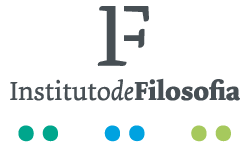Ref. FCT: RG-502-400124
PI: Paula Isabel do Vale Oliveira e Silva
The Research Group spans a wide chronological arc, focused mainly on the medieval reception of Aristotle's work, particularly De anima, Metaphysics, Physics, Generation and Corruption. Marked by an unprecedented enthusiasm, but also by a will to depth and discovery, the Medieval Latin reception of Aristotle's works shaped thought in all disciplines. Nevertheless, this was also a critical and creative reception, with an extraordinary philosophical diversity, at one time dogmatic and heterodox. It is that unremitting and highly specialized discussion that characterizes the scholastic thinking studied by the RG, focusing: (1) on the work of authors of Portuguese ascent or active in Portugal, in their interconnections with the most influential European philosophical centres; also being noteworthy the transition of philosophy and the sciences to the colonies of the New World, particularly Brazil, as well as to the East (India, Japan and China); (2) on the reconstruction of the institutional dynamic of the philosophical and scientific debate (study plans of the universities; discussion methods and argumentation; circulation of works and masters); (3) on its expression in the medieval and Renaissance Portuguese literature.
The RG has international projection, having in its team several foreign and national grantees who obtained their grants through public calls. The interconnection with the RG Reason, Politics, and Society and the new projects will enhance the capacity of attracting gifted PhD students and experienced researchers, from Portugal and abroad.
The setting of thematic study areas inside the RG is intended not only to increase the philosophical content of the RG, but also to facilitate its management, to integrate its resources, and to broaden the diffusion of the research results.
Objectives of the Research Group
The RG intends to do systematic research exploring four thematic fields, which were pivotal in philosophy from the 13th to the 17th Century. Expected results of this research are mainly critical editions, studies and papers, translations, cataloguing and description of sources, materials and tools for research (with in situ research of manuscripts or acquisition of reproductions). 3 to 6 seminars will be organised, with the publication of papers and 5 books, along with the translation and publication of 3 or 4 Suárez’s disputations on Methaphysics, Molina’s Questions on the Organon, and the tentative study of the unexplored commentary on the corpus aristotelicum by Marcos Jorge.
The reading and transcription of manuscripts is one of the main tasks and research results of the RG's members and its projects, theses and post-doctorates. Several texts were and are being transcribed for reading and discussion in the internal research seminars, later growing into communications and publications.
Advanced training and attraction of researchers is the most important contribution and a means toward the development of consistent work with international impact.
MAIN RESEARCH TOPICS
1. Metaphysics
The reception of Aristotle's Metaphysics in the West led to a debate on both the nature and object of a science of being qua being, and the place of this science. This debate took on particular characteristics between the 13th and 15th centuries, due to the divergent positions of the Schools. In the 16th and 17th centuries, it was rekindled in the particular context of the university teaching of the Reform. The RG aims to overcome the lack of in-depth study revealing how the core questions of metaphysics were seen over the five centuries of medieval Aristotelianism. Main authors: Gomes de Lisboa, Pedro Fonseca, Francisco Suárez, Marcos Jorge, John Poinsot.
2. Logic and Method
A large set of commentaries on Aristotle's works on Logic subsist as a result of the teaching of Philosophy in 16th century Portuguese and Spanish universities, produced by famous authors such as Pedro da Fonseca, Luis de Molina or John Poinsot. In continuance of ongoing research, the group will be particularly focused on Molina's unpublished commentaries on the "Organon".
The study of the influence and a translation with en face Latin revised text of the "Tractatus" or "Summulae logicales" by Petrus Hispanus is under preparation.
3. Nature and knowledge
A comprehensive study on the intersection between physics, cosmology and epistemology is needed. It will be based on the Commentaries on Aristotle's De Anima, De generatione et corruptione, Physica and Parva naturalia, De caelo et mundo. Particular emphasis will be placed on questions of knowledge (theories of the soul, sensation, abstraction, intelligibility, natural thinking) and of nature (mater, life, movement, light, cosmos). The study of the doctrines on the body-soul-mind relationship, explained by the 16th century Iberian academics, contributes to a better understanding of the transformations of Late medieval Aristotelian epistemology that are at the origin of Modern theories of knowledge, the will and the self. These issues determine the concept of human nature which has an impact on the prominent ethical and political debates about human dignity and the conquest of the New World, and were crucial to the formation of the Modern European frame of mind. The group will be particularly focused on: 1) the analysis of the psychological works by Petrus Hispanus, pursuing their critical edition; 2) Portuguese manuscript commentaries on Aristotle's De anima and De generatione, by prominent teachers of Coimbra and Évora, including the commentary by Marcos Jorge; 3) the vernacular literature in Portuguese.
4. Ethics and Politics
The study of the reception of Nicomachean Ethics and Politics will start with this period, first by identifying the manuscripts and then by examining some of the texts, starting with Luis de Molina’s fragmentary commentary.
Related project with external funding
- Petrus Hispanus: Critical Edition and Study of the Works - 1 (2016-2019) - FCT
- Animal rationale mortale
- Iberian Scholastic Philosophy at the Crossroads of Western Reason: The Reception of Aristotle and the Transition to Modernity
Internal project
